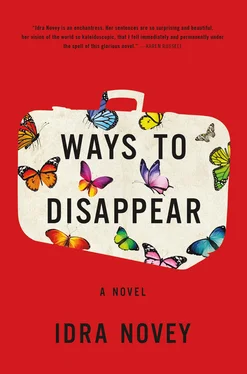Although that didn’t give him a reason to be rude to her translator, whose name he’d already forgotten.
Beatriz had written a curious story once about five brothers who had trouble remembering names, even each other’s. At dinner, to get one another’s attention, they’d throw bits of bread crust or sausage across the table. As grown men, they had trouble staying in love. They’d turn to touch the women beside them in bed and realize they had no memory of what their names were. In middle age, they struggled to recall their own names and had to call their parents for a reminder. However, by then their parents were hard of hearing and couldn’t differentiate among their sons’ voices on the phone. Whoever called, they would reply, Bruno — your name is Bruno, sweetheart. Their sons would then murmur the name to themselves as they buttoned their coats, trying to hold on to it until they got out the door. When they saw one another on the street, they’d shout, It’s me — Bruno! But I’m Bruno, the other would answer. Mother just told me. And the two brothers would stare at each other with — what had Beatriz called it? — the terrifying conviction of lost men.
The first time Rocha read the story, the terrifying conviction of those brothers reckoning with one another in the street stopped him cold. He’d been sitting in his office, and for a minute everything on his desk had an unsettling glimmer, like the scales on a just-killed fish or the glint of tinfoil floating on dark water in a well.
To: eneufeld@pitt.edu
Subject: in the next five days
Senhora Neufeld,
If I don’t get my money this week, I’ll be kidnapping your friend Marcus and taking one of his ears as interest.
Why? Because it’s due. You’re taking too long. I treat all my debtors the same. I believe in equality. If someone doesn’t pay what they owe me, I go to their family. Unless, of course, there is an American with nice legs involved and what’s owed to me is on its way.
Um beijo do
Flamenguinho

Emma read the email with her computer facing the window and then facing away from it. She had thought it might keep Beatriz safe a little longer, her sin of omission at the hotel bar about how much money a new novel by Beatriz would generate in English. But perhaps that had been a mistake. If she hadn’t played along with Flamenguinho’s assumptions, maybe he wouldn’t have thought to start wagering with Marcus.
She felt a longing for her parents, for their reassurance, for the effortlessness of a conversation in her own language. If she called her parents now, though, they would just plead for her to come home. They would stop sleeping. They would send Miles to fetch her and contact the U.S. Embassy, which would lead to the Brazilian police, and Raquel would be furious. She was adamant that they were too corrupt to be of any help and would just sell the story about her mother’s gambling to the media.
But maybe Raquel would see things differently now, with this threat to Marcus.
Absolutely not. No police, Raquel said when Emma called and read her the email. They’ll make everything worse. Print out the email. Let’s meet at a café, and don’t cry or look scared when you leave your room, Raquel warned her. You need to look composed. In control.
Emma nodded, though she had no idea how she might compose herself until she remembered her new hat. She set it on her head, tilting the wide brim at a lighthearted angle, though she was shaking. By the time she reached the lobby, she was so terrified she had to sit down. She pulled out her notebook to steady herself with a little fantasy, to disappear for just a moment into the relief of make-believe — into the plea hidden in every fiction for immortality.

Raquel didn’t know what to make of Emma’s enormous new hat. They’d just sat down for coffee and, staring across at the odd dark feather in it, she wondered if her mother’s translator was losing her mind. Otherwise, why start wearing a giant hat now and make it even easier for someone to stalk her through Salvador?
Raquel had brought the pages she’d found on her mother’s computer, thinking that Emma might discover something in them that she couldn’t. But at the sight of that hat on Emma’s head, with its baffling inky-blue feather, Raquel now saw the idea as desperate and absurd. Emma was as susceptible to suppressing common sense as her mother was.
I think Rocha will do it, Emma was saying now. He’ll definitely loan the money. Why wouldn’t he?
Because he’s a snob, Raquel said. And online gambling isn’t an aristocratic pursuit. She shoved one of the chocolate brigadeiros she’d ordered into her mouth. Rocha probably just sent the money that one time because it was nothing to him. He was probably embarrassed for her.
Raquel looked away from the table, mortified at what she’d admitted, and to Emma, of all people. She had a vivid memory of Rocha coming by the apartment when her mother was in one of her slumps. Before he arrived, Raquel had picked up all the clothes from the floor and guided her mother into the shower and combed her hair. It had been like preparing a giant, glass-eyed doll. She’d yelled at her mother afterward. It had been such a relief to be angry at her again, for her mother to be recovered enough that Raquel could furiously demand an apology.
With all the bank statements and their hundreds of subtraction signs, she’d fantasized about pushing her mother’s face into the debt the way people did with their dogs, and saying to her, Look what you’ve done this time. Look.
Yet here, in Salvador, Raquel’s capacity for anger seemed to be depleted. She couldn’t cry in front of her mother’s translator. If she did, Emma would take over everything.
You printed out the email, right? Can I see it, please?
Emma passed it across the table and asked Raquel if she’d read the news about the writer who’d disappeared into a tree in the Jardim de Alá.
I know the girl he raped, Raquel said. She’s the daughter of a congressman. Of all the asshole writers to follow my mother’s lead.
But no one will see it that way. Emma shook her head, making her ridiculous feather quiver in her hat. Tourinho’s not in your mother’s league. His work is derivative and predictable. He’s exactly the kind of writer who would climb into a tree to imitate someone who is the real thing. The real thing, Raquel, Emma repeated, her eyes gleaming, as if that were all this was about: whose words dazzled more.
Emma, Raquel said slowly, you do realize there is a very good chance you could die here, and wearing a giant hat like that only makes it easier for someone to follow you. They’ll cut off your ears and send them to me or to your husband and think nothing of it.
Emma lowered her eyes. Please stop saying that. I’m not married. I was living with a boyfriend, but I’m here now and I’m not going to leave until we find your mother.
Raquel pinched open the clasp on her purse. I’ll show you something, she said, but you have to promise not to do anything with it without my permission.
Permission:From the Latin for yielding. 1.Formal consent, as in: A translator must acquire permission to publish a story consisting of words that are not her own but that also incidentally are. See also:paradox. 2.Authorization, as in: If an author vanishes, her translator must receive written permission from the executor of the author’s estate or her nearest of kin. 3.The act of permitting, often confused with the more tacit and confusing acquiescence, as in: The nearest of kin, out of financial distress, may acquiesce and use the word “permission” but later regret it, or outright deny such a conversation ever happened. See also:quandary.
Читать дальше













